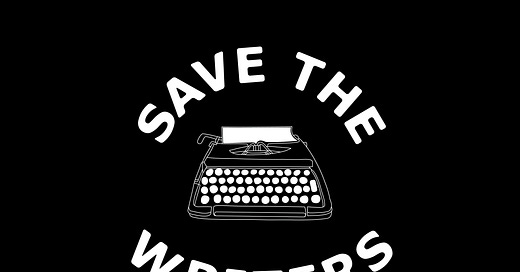“There are huge advantages to using one of the best AI writing tools to produce content. You’ll save time and cash, for starters, and you’ll still produce top-tier writing for your blog or website. Human intervention may extend to some editing before you upload, especially if you need to generate niche or specialist content, but that’s about it.”
—Apparently written by humans named Anna Sevilla and Mike Jennings for Techradar.com (December 15, 2022)
The future is here and it’s worse than even Orwell imagined. We’re all beating our breasts over artificial intelligence apps impacting children’s language arts homework (because no previous generation ever plagiarized the encyclopedia), but software programs have been “writing” for media companies and other businesses for years. This type of shadowy communication is also all over chat, email, and text messages, if you haven’t figured that out. But yes, because we the public have accepted all these deep fake sentences without complaint, the robots are now coming for your kids.
There are serious consequences ahead for all of us. I’m a flesh-and-blood writer facing professional extinction at the hands of a few sinister lines of computer code or some sketchy algorithms or something else that I don’t particularly understand but has been granted the dubious claim of “artificial intelligence.”
“AI”, as everyone calls it, like it’s a pet lemur, is at the non-beating heart of software applications like ChatGPT, which beget words and sentences in familiar orders after prompting from a few keystrokes; a tenth-grade term paper on the neurological effects of too much TikTok; an election speech on immigration written like Ronald Reagan in his 30s; a 46,000-word novel about Earth after all human language has gone extinct, or some other topic is dreamed up and then these applications produce results that stink like musk oxen dripping in Old Spice.
Artificially intelligent text-generating robots simply swallow huge volumes of data gathered from the digital public square and vomit out a compositional pattern matching the most anticipated human expectations. Instead of writing, there should be no doubt that these content-spawning robots are, in fact, generating crapola.
On February 20, Gideon Lichfield, global editorial director of Wired, spoke about ChatGPT on the 1A radio show: “The way that it works is that it is giving you kind of the average of all previous generated text and images that it was trained on. You give it the complete works of Shakespeare and ask it to write a sonnet and it will produce a Shakespeare sonnet that sounds kind of like Shakespeare because it is in that style but it really is the middle of the road, the average, the generic version of Shakespeare based on whatever prompts you gave it.” Lichfield followed that with: “A.I. is being used to generate, to produce things where you don’t need something exceptional.”
Lichfield never said AI is “writing” because it’s not. It’s producing content—and not the name-brand stuff either. The byline of an article, which Lichfield knows as well as anyone else in the words business, is half the glory of publishing compositions from real and compelling people like Serena Williams and James Cameron, as he has done. How’s it really going to look for some Wired feature story to be written by Tandy 3000 with photographs by Ring Video Doorbell?
And before leaving Lichfield’s analysis: How exactly does a robot correctly determine the “average” Shakespearean sonnet? Can such work be shown mathematically or in a pie chart?
The goal of AI with machine learning is to evolve the binary code to “think” rationally (like some of us humans); the villainous über-goal is for a digital-thinking grotesquerie to gain superior rationality and then be welcomed as our default decider whenever things require really, really hard thinking.
But again: such achievements would be based on preposterous human presumptions that cold calculations can quantify correct corollaries and conclusions.
Thinking about it reminds me of Dead Poet’s Society (written by Homo sapien Tom Schulman) when Robin Williams’s character, English teacher “John Keating,” implores his students to tear out a textbook page featuring an L graph that claimed to measure “greatness” in poems. “Rip it out!”
Sure, this non-self-aware AI software stuff spits out spec scripts and term papers with ease and quickness, but those are dead giveaways against any claim of writing; ergo, AI is no writer.
The most succinct and accurate definition of “writer” that I’ve come across—which I’m willing to bet came from a human—is this: A writer is someone for whom writing is especially difficult.
Here’s why that’s true and why it matters today.
A real writer is sometimes paid to think for a while about a topic. Really good writers get paid to think long and hard about topics. And great writers steal from other writers but that takes time too. During this critical passage of time, writers naturally engage in those clichéd activities that Hollywood and dime-store novels push, like drinking, smoking, and carousing (which ain’t too bad if you had to pick clichés). Essentially, to the civilian’s untrained eye, there appears to be disinclination toward work rather than any endeavor to apply the seat of one’s pants to the seat of one’s chair and write. (I stole that last part from a real and really talented human writer.)
But—I swear—naps and procrastination are integral to the writing process because it takes time to form something from nothing. Areas of the human brain, such as the amygdala and the hypothalamus, must work in harmony in order to form emotions, which come in handy when composing text for emotional creatures. Personally speaking, the longer my brain works with a subject the more opportunities arise for infusing emotional connections into the balance of scholarship and relevancy I seek for my finished stories.
But a bot doesn’t even know why it’s important to write a metaphor, much less generate text with any intention of connecting with any reader. It doesn’t know that someone is supposed to feel something when they read. It doesn’t know anything.
As for AI being cheaper, well that’s a real dull surprise. I actually thought it’d be harder to charge less for content creation than human writers actually get paid. On that subject, the needle hasn’t moved a micro-inch forward in my 30 years of writing. For consumer journalism, I don’t think too many writers will disagree that 50 cents a word is typically good for web content; anyone earning a dollar a word for print is getting closer to the top floor for working writers than they might want to believe.
Still, paying a one-time price to download a word-generating application (or worse, using a free one) will certainly reinforce the old human saying that you get what you pay for.
I’ve read examples of an AI magician’s tricks and I am human enough to admit that there will come a day when I will be fooled, although I don’t know yet if I can be swayed. What AI prints on the screen (or paper page) lacks sentience. It feels devoid of free will. It misses a sense of purpose beyond its primary objective.
Yet AI fools so many of us because we’re easily fooled when it comes to language, especially when we’re not expecting it, like in our novels and songs.
Speaking of songs, in everyone’s favorite dystopian novel, 1984, George Orwell refers to a department in the Ministry of Truth still employing humans to write and produce sexy movies and novelettes for the working-class proles. Protagonist Winston Smith, a writer for the records department in the same ministry, homogenizes public records through continual, dizzying misinformation. Even though the Ministry of Truth produced music without a human hand ever taking part, Orwell assumed that written propaganda would always need the human touch.
We’re way past 1984. If you’re okay with all this… if you’re so willing to let algorithms guide your life, then why don’t you let the supermarket barcode scanner prepare your taxes? Why not read the latest traffic-crime novel from Self-Serve Parking Lot Booth #45-AA2? Want to go to the movies and see Crisis on the Ground Floor? It was “written” by a Roomba.
In Dead Poet’s Society, Keating rails against invalid measurements of unmeasurable qualities. He knows only people can truly understand what stirs our imaginations. “This is a battle. A war,” he insists, remaining firmly unmoved by artificially creative contrivances. “And the casualties could be your hearts and souls.”
Schlocky? Of course. True? Well, think of it like this. There very well could come a day when the last human-written word is only known as a legend—a rumor of something saved on a USB memory stick that’s filed away in the ancient and crumbling Museum of the Human Language, hidden in the mountains of a small Pacific island. Sci-fi writers have dreamed up and written much more horrifying scenarios.
Of course, the possibility exists that we’ll all bridge together and decide unanimously that this technology will be shaped into a form that carries forth the common good for as many as possible, which would require two things:
1. Humans are given priority over robots when it comes to any content-generating project, and that
2. This technology should never be used to fool anybody; its use must be visibly noted.
I hold little hope that either of those are in our future. Computer code is going to pay little attention to emerging writers with far-from-the-average prose. Apps designed specifically to out-generate human writers’ quantities will also re-organize (more like fudge up) our organic processes for seeking out and valuing what we read. The more recklessly we use this tech, the quicker our once-dynamic language settles into tomorrow's overly familiar, middling expectations.
It’s possible that we’ve been using some form of proto-writing for about 20,000 years. And we know this because history is written by the winners. Make sure that there is always a human hand writing the victories of human history. In this time of crisis, I can think of no better words than these: Save the writers. Eat a robot.
If you prefer to make a one-time donation, you can contribute any amount to Juke using these Venmo and Paypal links.
Anthony Head mostly writes about Texas.






As I read this, I thought of the city room where I spent three years learning from passionate newspeople and writers. They were perhaps the last, or next to last, generation to experience that rhythm and angst that permeates their writing. They came in direct contact with events that were making history. While their words filtered and distilled the facts for the sixth-grade-level reader that was the American public, those words stirred passion in the reader to create discourse, even if it was only discussed around the coffee shop booth or barbershop.
"Unless we learn how to prepare for, and avoid, the potential risks, AI could be the worst event in the history of our civilization. It brings dangers, like powerful autonomous weapons, or new ways for the few to oppress the many. It could bring great disruption to our economy.” Stephen Hawking
And apparently dumb down Shakespeare, not to mention Bukowski.